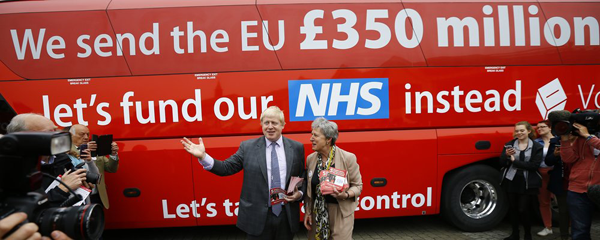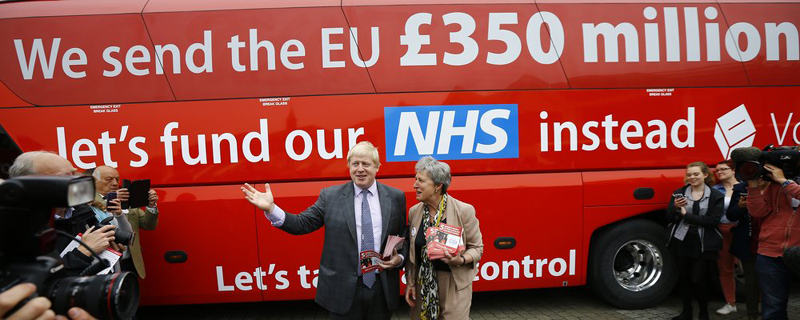
Brexit
British voters and child abuse
by Marc-André Cotton
This article was published in a shortened version in Clio’s Psyche, volume 23, No 2, pp. 173-177, (Winter 2017).
Abstract: A ‘values lines’ divide is likely to account for pro- and anti-EU attitude in the United Kingdom, a psycho-demographic approach suggests. Sub-groups motivated by fear of perceived threats swung most strongly to vote ‘Leave’—giving indication of the powerful forces at play when repressed feelings and emotions associated with child abuse are displaced in a heated political context.

Since a clear majority of British citizens decided to leave the European Union on June 23, heated comments have been voiced. According to The Financial Times, their largely Europhile parliament will be forced to drag the country into “unsplendid isolation” as Britain is heading for “a quite probable recession” (Philip Stephens, “Britain is starting to imitate Greece”, Financial Times, 06/30/2016). Not surprisingly, The Spectator—where former Mayor of London and ‘Vote Leave’ campaigner Boris Johnson once worked as a journalist—holds a different view. Waving reassuring news as a falling pound attracts tourists and sucks in investment, the conservative weekly neologized Brexit “the greatest opportunity ever handed to a government by an electorate” (“Business confidence is returning to Brexit Britain”, The Spectator, 07/29/2016).
Indeed, fantasies and misrepresentations surrounding this controversial issue have polarized opinions to the point that there is no clue as to what lies ahead. On top of that, shortly after the Brexit referendum, prominent supporter of the Leave campaign Nigel Farage stepped back and resigned as leader of the UK Independence Party (UKIP), giving the impression that he absolved himself of responsibility for potential damage (Helen Lewis and Stephen Bush, “The Brexit cowards: we left Europe, then they left us to it”, New Statesman, 07/07/2016). The main rhetoric of the pro-Leave—“Let’s Take Back Control!”—thus triggered a backfire and a sense of betrayal. “At the top of British politics, an insider suggested, a vacuum yawns wide. The phones are ringing, but no one is picking up.” (Bagehot, “Britain is sailing into a storm with no one at the wheel”, The Economist, 06/26/2016)
A “deep-seated hostility”
Admittedly, British recrimination over European affairs is hardly new. A stronghold of democracy since the French surrender of June 1940, the country was not prone to self-examination after WWII whereas France and Germany laid grounds for an economic integration of the continent to prevent future conflicts. In the 1950s, after Indian Independence, Britain grieved the loss of her Empire by securing a Commonwealth preference system with former colonies whilst fighting tooth and nail against the common market scheme. Treasury officials even issued a ‘Plan G’—namely a free trade agreement designed to assert British commercial leadership over Europe—perceived by supporters of European integration as a malicious sabotage effort by ‘perfidious Albion’ (David Gowland et al., Britain and European Integration Since 1945: On the Sidelines, Routledge, 2009, p. 45).
Subsequently, the French President de Gaulle vetoed Britain’s application to join the Common Market on two occasions, accusing her of a “deep-seated hostility” towards the European construction (“1967: De Gaulle says ‘non’ to Britain—again”, BBC, 11/27/1967). When the United Kingdom finally joined the Europe of Six, on January 1973, it remained “one of the more reluctant countries” according to negotiator Sir Crispin Tickell and would spend much time arguing about details (interviewed by Stephen Moss, “How Britain negotiated its entry to the EEC-then failed to play its part”, The Guardian, 06/25/2016). To many Britons, the EU still confuses with over-generous subsidies and a rising tide of desperate people on the verge of sweeping their homeland.

Fig. 1 : Lead Brexiteer Boris Johnson in front of "Battle Bus" with false claim that the UK sends £350 million a week to Brussels. (infacts.org))
Thatcher’s privatization program
Illustrative of such frame of mind, Prime Minister Margaret Thatcher’s bargaining with Brussels known as the ‘UK rebate’ has been much written about. In the 1980, at a time when most Conservatives favored European integration, she fought over Britain’s participation to the EEC budget, asking for “[her] own money back” and eventually obtaining a two-third refund of UK’s annual net contribution. As for today, Britons are the eight-biggest contributors to the EU on a per-head basis (James Kirkup, “EU Facts: how much does Britain pay to the EU budget?”, The Telegraph, 02/29/2016). Nevertheless, as encouraged by pro-Leave tabloids, British taxpayers are inclined to think they pay more than their share to “the growing pensions of European Union fat cats” (Jake Burman, “Now UK taxpayers forced to contribute BILLIONS towards Brussels bureaucrats’ PENSIONS”, Daily Express, 11/09/2015).
It is seldom considered that the Brits themselves have largely contributed to their financial despair. During the Thatcher Years, inequality surged as a major privatization program meant to reverse “the corrosive and corrupting effects of socialism” swept the public sector (Margaret Thatcher, quoted by Alistair Osborne, “Margaret Thatcher: one policy that led to more than 50 companies being sold or privatised”, The Telegraph, 04/08/2013). The shares of these companies were not affordable for most ordinary citizens and became property of foreign groups and states. Subsequent restructuring measures such as downsizing and increased cost to consumers have deprived many UK household of vital services and shifted the tax burden to working people—and the shame to the powerless. Film director of I, Daniel Blake, a welfare state drama awarded the 2016 Palme d’Or at Cannes, Ken Loach argues: “We have to look again at this whole cruel sanctions and benefit system which is out to tell the poor that their poverty is their own fault.” (Ken Loach, interview by Sarah Montague, “Ken Loach on ‘despair’ behind benefit system film”, BBC Radio, 05/23/2016).
Concern over immigration
Powerful fantasies are at play on the immigration front too. In 2015, statistics show that net migration to the UK was over 333,000 and rising—a surge Brexiteers have used to suggest that “mass immigration is still hopelessly out of control and set to get worse if we remain inside the EU” (Nigel Farage, quoted by Alan Travis, “Net immigration to UK nears peak as fewer Britons emigrate”, The Guardian, 05/26/2016). Ironically, the strength of the UK labor market is thought to be a key driver of this evolution with the majority of such increase involving countries of western and southern Europe. Prior to the Brexit referendum, polls showed that roughly three-quarters of Britons wanted immigration cut, but disagreed on how to achieve this goal, many voters saw—and were probably misled into thinking—the Leave vote as a way to rein it in, although campaigners never got into specifics. Former Justice Secretary and lead Brexiteer Michael Gove even suggested that a UK withdrawal could see Britain accept more immigrants, albeit from outside the EU (Asa Bennett, “Did Britain really vote Brexit to cut immigration?”, The Telegraph, 06/29/2016).
In the last decade, the rise of UKIP—a third party that gained 27.9% of British electorate in the May 2014 European Election, ahead of Labour and the Tories—underscored the importance of immigration in the people’s minds. Concern over integration of minority communities was joined by much debate about British national identity. Demographics of the Brexit vote show that the British majority of England and Wales—where opposition to migrants and concomitant support of UKIP are highest—has tipped the scale in favor of a withdrawal. Areas with a prominent share of over 65s scored the highest anti-EU votes, indicating that the Leave option appealed to the older generation (Ashley Kirk and Daniel Dunford, “EU referendum: How the results compare to the UK’s educated, old and immigrant populations”, The Telegraph, 06/27/2016). But Professor of Politics Eric Kaufmann suggests that is was primarily values that motivated voters, not age or education. “Invisible attitudes are more powerful than group categories, he argues. The same is true for a person’s immigration attitudes.” (Eric Kaufmann, “Its NOT the economy, stupid: Brexit as a story of personal values”, The London School of Economics and Political Science, 07/07/2016).

Fig. 2 : A recent Angus Reid Public Opinion poll found that 63% oppose a ban on spankin in the UK. (angusreid.org))
A “values lines” divide
Among those who think European unification has gone too far, support for the death penalty strongly correlates with Brexit voting intention. A similar picture results when Eurosceptics express their views on the importance of disciplining children, whipping sex criminals, or keeping the nation safe. “This speaks to a deeper personality dimension which social psychologists like Bob Altemeyer, Kaufmann disputes, dub Right-Wing Authoritarianism (RWA).” As further shown by Chris Rose of Campaign Strategy, an NGO consulting firm working with the British Value Survey as a tool, “there was clear evidence from existing values surveys that pro- and anti-EU attitudes strongly divided along values lines”. This values based segmentation of the nation group forms a ‘psycho-demographic’ system, Rose argues. In this case, sub-groups motivated by fear of perceived threats, safety and control, or the need for clear-cut rules swung most strongly to vote ‘Leave’, whereas people oriented towards success or prioritizing individualism and cultural equality—over-represented in younger age classes—voted ‘Remain’ (Chris Rose, “Brexit, Values and Age”, Three Worlds Blog, www.campaignstrategy.org, 06/26/2016).
As we know from other research, such as political psychologist Theodor Adorno’s, a harsh upbringing will most probably result in personal values like submission to parental authority, a sense of duty and order, as well as in-group orientation—all the while fostering a strong resentment and feelings of victimization disguised under mechanisms of displacement (Else Frenkel-Brunswik, “Parents and childhood as seen through the interviews”, in Theodor Adorno et al., The Authoritarian Personality, Studies in Prejudice Series, Vol. 1, Chapter X, Harper & Brothers, 1950, 337-389). It is not unreasonable to suggest that the Openness vs. Closure divide characteristic of the Brexit vote overlaps childrearing patterns and beliefs, with a likely correlation between maltreatment in childhood and Leave support.
Indeed, the immigration issue induces a loss of cultural benchmarks in the ethnic English majority, triggering a sense of disintegration stemming from infancy. Debates surrounding the National Health Service (NHS) funding reflect a growing fear of dispossession that has little to do with economic reality. Within hours of the Brexit vote for instance, the official Leave campaign’s call to divert UK’s EU contribution to the NHS proved a false claim (Kate McCann and Tom Morgan, “Nigel Farage: £350 million pledge to fund the NHS was ‘a mistake’”, The Telegraph, 06/24/2016). Such inflammatory rhetoric is often meant to stir up feelings of victimization—all too common in adults who were abused as children—only leading to further frustration once the game has been played (fig. 1).
A nation of “enthusiastic smackers”
The UK bears a painful legacy of child abuse dating back to the Victorian era when ‘the rod’ was commonly used to subjugate children. Corporal punishment in British state-run schools was only banned by parliament in 1987, and as late as 1998 in other private schools of England and Wales (Colin Farrell, “United Kingdom School CP”, www.corpun.com). Significantly, traditional English-education is commonly linked with childhood violence, pain and stoicism in the eyes of mainland Europeans, with (in)famous Eton College standing as a hallmark of discipline for the British aristocracy. In a 2006 survey, 80% of respondents still believed in beating children, while 73% said a ban would result in an increase of juvenile delinquency—reflecting an image of Britain as “a nation of enthusiastic smackers” (Rosemary Bennett, “Majority of parents admit to smacking children”, The Times, 09/20/2006). More recently, a 2012 Angus Reid Public Opinion poll found that 63% opposed a ban on spanking in the UK (fig. 2). Under existing laws, parents in England and Wales are allowed to “reasonably chastise” their children—that is as long as the blows leave no mark—but near half of Britons think even these rules go too far (Mario Canseco, “Britons Opposed to Banning Parents from Smacking Their Children”, Angus Reid Institute, 02/29/2012).
The extend to which British adults had been abused as children recently came as a surprise after the Office for National Statistics (ONS) introduced new questions on this topic in the 2016 Crime Survey for England and Wales. In the first study of its kind, the data show that 9% of respondents aged 16 to 59 report psychological abuse, 7% physical abuse, 7% sexual assault and 8% witnessing domestic violence or abuse in the home. The proportion of adults reporting ill-treatment tends to increase with age and women are more likely than men to suffer sexual assault by rape or penetration, with an estimated 567,000 adult women having experienced this type of abuse in childhood (“Abuse during childhood: Findings from the Crime Survey for England and Wales, year ending March 2016”, Office for National Statistics, 08/06/2016). These figures give an indication of the powerful forces at play when repressed feelings and emotions associated with such outrage surface and are displaced in a heated political context—particularly within an aging population. Given this unacknowledged reality, diverting such resentment towards outside targets such as migrant workers and EU regulation proved an easy win for Brexit campaigners and fear-mongering demagogues. And as the saying goes: When you play with fire, you end up getting burned.
Marc-André Cotton*
© M.A. Cotton – 2018.08 / regardconscient.net
*Marc-André Cotton, MA, the President of the International Psychohistorical Association, and an International Member of the Psychohistory Forum, is a teacher, independent scholar, and director of the French website Regard conscient, dedicated to exploring the unconscious motivations of human behavior. He authored the French psychohistorical book Au Nom du père, les années Bush et l’héritage de la violence éducative published in 2014 by L’Instant présent (Paris).
